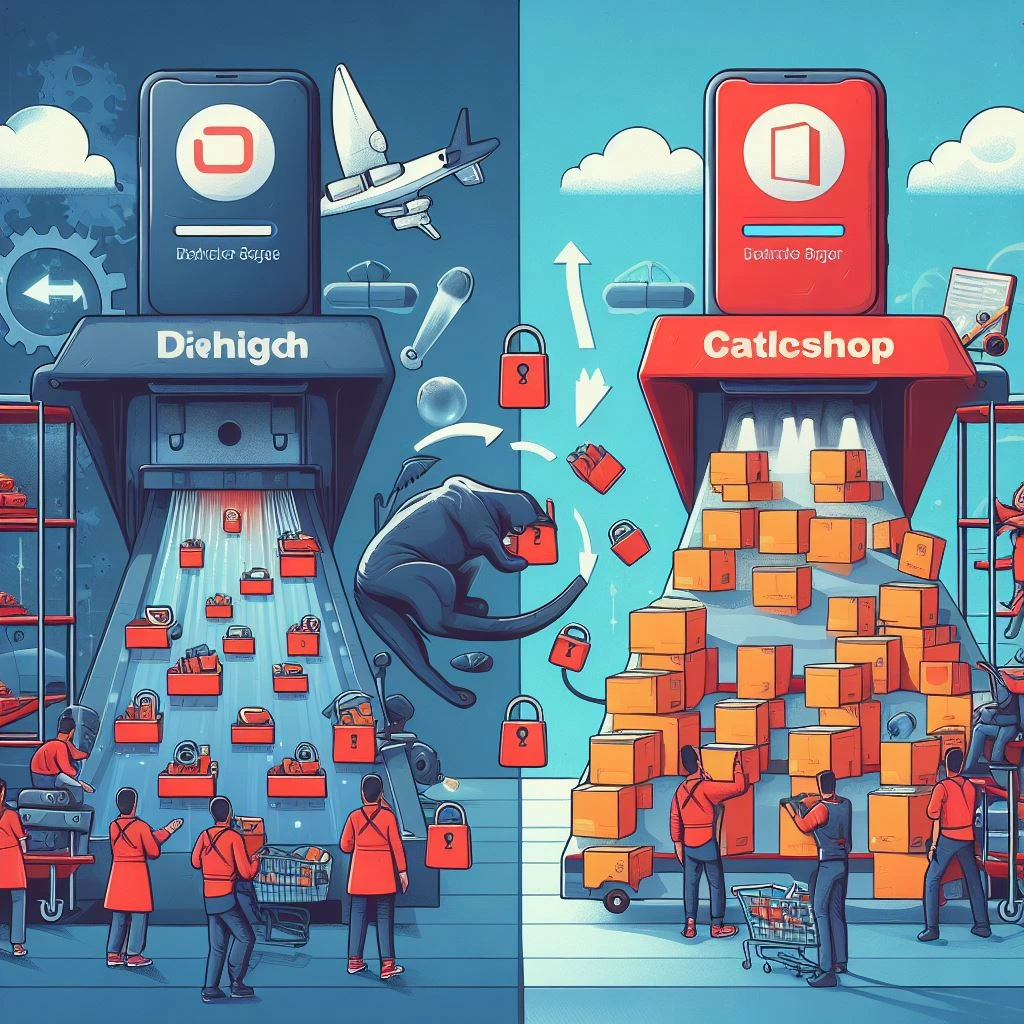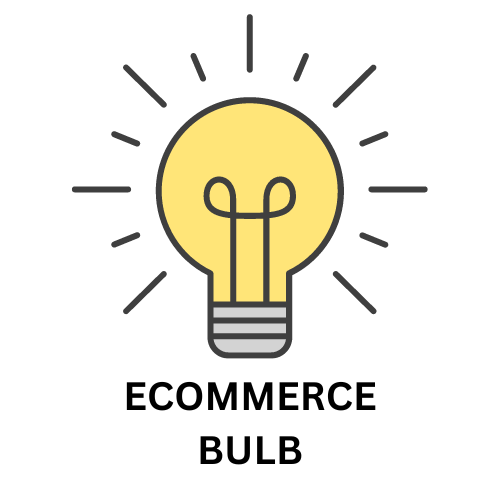In order to decide which ecommerce platform to use, Volusion vs Ecwid. A detailed comparison between features must be thoroughly done. If you want to decide which eCommerce platform to choose, there are many things to consider.
These are some examples of these factors:
- Cost.
- SEO friendliness.
- Page load speed.
- Canonical website URL.
- Indexing Control.
- Customizable HTML capabilities.
- Sitemap Generator.
- Integration with Google Analytics.
- Product Tagging and Categorization.
- Batch Uploading.
- Mobile Optimization.
- Built-in Blogging and Marketing Features.
- Social Sharing Buttons.
- Content Management Capabilities.
- Discount and promotion code tools.
- Easy to use Checkout.
- Reporting tools and custom reports.
- Integration of email marketing tools.
- Multiple payment options.
- Flexibility to add new eCommerce features.
- Exclusive features.
- Cons and pros.
Here we’ll discuss these factors to help you decide which platform is better for you, Ecwid or Volusion. And at the end of the discussion, we’ll recap and make a comparison for the scores of all these points to find out which eCommerce platform has the higher score, so that you’ll have a good view about both of them.

Pricing (Volusion vs Ecwid):

Volusion
- Pricing Structure: Volusion offers tiered plans with monthly fees and transaction fees.
- Plans:
- Personal: $29/month + transaction fees (suitable for small businesses with sales up to $50,000 annually)
- Professional: $79/month + transaction fees (suitable for growing businesses with sales up to $100,000 annually)
- Business: $299/month + transaction fees (suitable for medium-sized businesses with higher sales volume)
- Prime: Custom pricing for large businesses with enterprise-level needs.
- Transaction Fees: Volusion charges a 1% – 2% transaction fee (depending on your plan) on top of the monthly fee for each sale you make.
- Free Trial: Volusion offers a 14-day free trial.
Ecwid
- Pricing Structure: Ecwid offers a free plan with limited features and paid plans with monthly fees.
- Plans:
- Free: Ideal for testing the platform, allows you to add up to 10 products to your store.
- Venture: $12.50/month (up to 100 products, discount codes, abandoned cart recovery)
- Business: $25/month (up to 2500 products, product variations, digital goods)
- Unlimited: $49/month (unlimited products, advanced features like gift certificates, memberships)
- Transaction Fees: Ecwid does not charge any transaction fees on any plan.
- Free Trial: Ecwid offers a free plan with no time limit.
Here’s a quick comparison table:
| Feature | Volusion | Ecwid |
|---|---|---|
| Pricing Model | Tiered plans with monthly & transaction fees | Tiered plans with monthly fees (no transaction fees) |
| Free Plan | No | Yes (limited features) |
| Monthly Fee Range | $29 – $299+ | $0 – $49 |
| Transaction Fees | 1% – 2% | None |
| Free Trial | Yes (14 days) | N/A (Free plan available) |

SEO Capabilities (Volusion vs Ecwid):

Volusion:
- Built-in SEO Tools: Volusion offers a dedicated SEO section within the admin panel. This allows you to:
- Manage meta titles and descriptions: Optimize titles and descriptions for each product and page.
- Control URL structure: Configure SEO-friendly URLs (e.g., using hyphens instead of underscores).
- Submit sitemaps: Generate and submit sitemaps to search engines to improve indexing.
- Enable canonical links: Avoid duplicate content issues by specifying the canonical versions of pages.
- Customization: Volusion allows some level of customization for SEO elements, like enabling comments for blog posts (which can be good for SEO).
- Integrations: Volusion integrates with various SEO tools like Google Search Console for further optimization.
Ecwid:
- Basic SEO Features: Ecwid offers basic SEO functionalities like:
- Editing product titles and descriptions: Optimize title tags and product descriptions for relevant keywords.
- Managing URLs: Ecwid generates product URLs automatically, but customization options are limited.
- Generating sitemaps: Ecwid automatically generates sitemaps for your store.
- Limited Customization: Ecwid offers fewer built-in SEO tools and customization options compared to Volusion.
- Integrations: Ecwid integrates with some SEO tools, but the selection might be smaller compared to Volusion.
Here’s a table summarizing the key points:
| Feature | Volusion | Ecwid |
|---|---|---|
| Built-in SEO tools | More features and customization options | Fewer features and limited customization |
| URL management | More control over URL structure | Limited control over URLs |
| Integrations | Integrates with more SEO tools | Integrates with some SEO tools |

Page Load Speed (Volusion vs Ecwid):

Volusion:
- Limited Public Data: There’s no readily available, independent data comparing Volusion’s average page load speed to other platforms.
- User Reviews: Some Volusion user reviews mention concerns about store loading speed, particularly for larger stores with many products and images.
- Volusion’s Efforts: Volusion claims to use various techniques for faster loading times, including server optimization, caching, and image compression. However, the effectiveness of these efforts for individual stores might vary.
Ecwid:
- Focus on Speed: Ecwid emphasizes fast loading times as a key advantage.
- Server Infrastructure: Ecwid utilizes globally distributed servers and claims to prioritize speed and performance.
- Image Compression: Ecwid automatically compresses product images to optimize their size for faster loading.
Challenges to Consider:
- Individual Store Variations: Page load speed can be impacted by various factors beyond the platform itself, such as store design, number of products, plugins, and hosting plans.
- Limited Control: Both platforms offer some control over image optimization, but extensive customization options for speed optimization might be limited.

Canonical Website URL (Volusion vs Ecwid):

Volusion:
- Built-in Functionality: Volusion offers a dedicated SEO section within the admin panel where you can specify the canonical URL for each product page and potentially other relevant pages.
- User Control: You have more control over defining the canonical URL for your Volusion store pages.
Ecwid:
- Automatic Generation: Ecwid likely generates canonical URLs automatically based on your store structure and product URLs.
- Limited User Control: While Ecwid might offer some options for managing product URLs, directly specifying canonical URLs for all pages might be limited.
Here’s a table summarizing the key points:
| Feature | Volusion | Ecwid |
|---|---|---|
| Approach | User-defined canonical URLs | Likely automatic generation |
| User Control | More control over specifying canonical URLs | Limited control over canonical URLs |
Is Volusion safe?
Volusion’s security has been a concern in the past, with a major data breach reported in 2019 where hackers gained access to customer payment information through a vulnerability in Volusion’s infrastructure.
Here’s a breakdown of Volusion’s security measures and potential concerns:
Security Measures:
- Industry Standards: Volusion claims to maintain compliance with PCI DSS (Payment Card Industry Data Security Standard) which is a set of security requirements for organizations that handle cardholder information.
- Security Features: Volusion mentions using various security features like firewalls, intrusion prevention systems, and data encryption to protect user data.
Potential Concerns:
- Past Data Breach: The 2019 data breach highlights potential security vulnerabilities in Volusion’s infrastructure.
- Limited Transparency: There might be a lack of detailed information publicly available regarding the specific security measures Volusion implements.

Indexing Control (Volusion vs Ecwid):

Volusion:
- Limited Control: Volusion offers basic indexing control through the SEO section of its admin panel. You can typically:
- Submit sitemaps: Generate and submit sitemaps to search engines to improve indexing of your store pages. This helps search engines discover your content.
- Noindex specific pages: Potentially mark individual pages as “noindex” to prevent them from being indexed by search engines (useful for internal pages like your shopping cart).
Ecwid:
- Limited to Automatic Controls: Ecwid likely relies on automated indexing based on its platform structure and page types.
- User Control Might Be Restricted: Direct control over individual page indexing might be limited for Ecwid users.
Here’s a table summarizing the key points:
| Feature | Volusion | Ecwid |
|---|---|---|
| Indexing Control Level | Limited control (sitemap submission, noindexing specific pages) | Limited to automatic controls |
| User Control | More user control over indexing options | Limited user control over individual page indexing |

Customizable HTML Capabilities (Volusion vs Ecwid):

Volusion:
- Offers More Flexibility: Volusion provides more control over the HTML of your store pages. You can potentially:
- Edit Themes: Access and modify the HTML code within Volusion’s built-in themes or create custom themes from scratch using HTML, CSS, and JavaScript.
- Inject Custom Code: Volusion might allow injecting custom HTML snippets into specific sections of your store pages for further customization.
Ecwid:
- Limited HTML Editing: Ecwid offers minimal to no direct editing of HTML code within the store builder.
- Theme Customization: Ecwid themes might offer limited options for customizing the look and feel using pre-defined settings or a drag-and-drop interface.
- Limited Code Injection: Ecwid might have limited functionality for injecting custom HTML code snippets into your store pages.
Here’s a table summarizing the key points:
| Feature | Volusion | Ecwid |
|---|---|---|
| HTML Editing Level | More flexible editing and customization | Limited to no direct HTML editing |
| Theme Customization | Supports editing themes with HTML/CSS/JS | Limited theme customization options |
| Custom Code Injection | Potentially allows injecting custom HTML snippets | Limited to no code injection capabilities |

Sitemap Generators (Volusion vs Ecwid):

Volusion:
- Automatic Sitemap Generation: Volusion likely generates sitemaps automatically based on your store structure and product pages.
- Sitemap Management: Volusion allows you to submit the generated sitemap to search engines like Google Search Console. You might also have options to download the sitemap file for manual submission.
Ecwid:
- Automatic Generation: Ecwid likely generates sitemaps automatically as well.
- Limited User Control: Ecwid might offer minimal control over the sitemap itself, but you should be able to submit it to search engines.
Here’s a table summarizing the key points:
| Feature | Volusion | Ecwid |
|---|---|---|
| Sitemap Generation | Automatic | Automatic |
| User Control | More control over managing and submitting sitemaps | Limited control over the sitemap itself |
General Considerations:
- Sitemaps are crucial for SEO as they help search engines understand the structure and content of your website.
- Regularly updated sitemaps ensure search engines are aware of any new or modified pages on your store.
Choosing Between Volusion and Ecwid for Sitemaps:
- Both platforms are suitable: As both Volusion and Ecwid generate sitemaps automatically, the choice wouldn’t depend solely on this factor. Consider other aspects like ease of use, SEO features, and pricing when making your decision.

Integration With Google Analytics (Volusion vs Ecwid):

Volusion:
- Built-in Integration: Volusion offers a dedicated integration with Google Analytics within the platform’s admin panel.
- Setup Process: Volusion likely provides a guided process to connect your store with your Google Analytics account.
- Data Tracking: Volusion should automatically track various data points about your store’s visitors and their interactions, feeding that information into your Google Analytics reports.
Ecwid:
- Integration Options: Ecwid likely offers integration with Google Analytics through its app marketplace or settings. You might need to find and install the Google Analytics app.
- Setup Process: Ecwid should guide you through the setup process, but it might involve additional steps compared to Volusion’s built-in integration.
- Data Tracking: Similar to Volusion, Ecwid should automatically track relevant data and send it to your Google Analytics account.
Here’s a table summarizing the key points:
| Feature | Volusion | Ecwid |
|---|---|---|
| Integration Type | Built-in integration | Integration via app or settings |
| Setup Process | Likely easier and more streamlined | Might involve additional steps |
| Data Tracking | Automatic data tracking | Automatic data tracking |

Product Tagging and Categorization (Volusion vs Ecwid):

- Volusion:
- Allows assigning multiple tags to each product.
- Tags can be used for various purposes, like filtering, promotions, or internal organization.
- You might be able to create custom tags in addition to any pre-defined options.
- Ecwid:
- Might offer product tagging functionalities, but the level of customization and available tag types might be limited compared to Volusion.
- Tags might primarily focus on product attributes or internal organization.
Product Categorization:
- Volusion:
- Offers a hierarchical category structure for organizing products.
- You can create subcategories within main categories for more granular organization.
- Might allow bulk editing of product categories for efficiency.
- Ecwid:
- Likely provides category structures for organizing products.
- The level of hierarchy and customization options might be simpler compared to Volusion.
Here’s a table summarizing the key points:
| Feature | Volusion | Ecwid |
|---|---|---|
| Product Tagging | More flexible with custom tags and multiple tagging options | Potentially limited tagging functionality |
| Product Categorization | Hierarchical structure with subcategories | Likely simpler category structure |

Batch Uploading (Volusion vs Ecwid):

Volusion:
- CSV Import: Volusion allows importing product data from a CSV (Comma-Separated Values) file. This is the primary method for batch uploading products.
- Template Provided: Volusion likely provides a downloadable CSV template to ensure your product data is formatted correctly for import.
- Bulk Editing: Volusion might offer additional features for bulk editing existing products after uploading them through the CSV import.
Ecwid:
- CSV Import: Ecwid likely supports product data import through CSV files as well.
- App Integration: Ecwid might offer additional options for batch uploading through apps available in their app marketplace. These apps could provide specialized import functionalities or integrate with specific inventory management systems.
- Limited Bulk Editing: Ecwid’s bulk editing features for existing products after upload might be limited compared to Volusion.
Here’s a table summarizing the key points:
| Feature | Volusion | Ecwid |
|---|---|---|
| Primary Upload Method | CSV Import | CSV Import |
| Additional Options | Bulk editing features | Potential app integrations for import |
| Bulk Editing Capabilities | More extensive bulk editing options | Potentially limited bulk editing features |

Mobile Optimization (Volusion vs Ecwid):

Volusion:
- Responsive Design: Volusion offers responsive themes that automatically adjust to different screen sizes, including mobile devices. This ensures your store looks good and functions well on phones and tablets.
- Limited Control: While responsive, Volusion themes might offer limited control over the mobile-specific layout compared to fully customizable options.
- Legacy Themes: If you’re using an older Volusion theme, it might not be mobile-friendly and require upgrading for optimal mobile experience.
Ecwid:
- Mobile-Friendly Design: Ecwid focuses on mobile-friendliness, ensuring your store displays well on smartphones and tablets.
- Limited Customization: Ecwid’s mobile optimization might come with less customization compared to creating a fully customized mobile experience on Volusion.
Here’s a table summarizing the key points:
| Feature | Volusion | Ecwid |
|---|---|---|
| Mobile Optimization Approach | Responsive themes | Mobile-friendly design |
| Customization | Limited control over mobile-specific layout | Limited customization options |
| Potential Concerns | Older themes might not be mobile-friendly | Less control over the mobile experience |

Built-in Blogging & Marketing Features (Volusion vs Ecwid):

Volusion:
- Blogging: Volusion offers a built-in blogging platform with basic functionalities like creating posts, scheduling them, and managing categories.
- Marketing Features: Volusion provides a range of built-in marketing tools, including:
- Email Marketing: Create and send email campaigns to your customers.
- Coupons and Promotions: Set up discounts, coupons, and other promotional offers.
- SEO Tools: Manage basic SEO elements like meta titles and descriptions for your store pages.
- Social Media Integration: Integrate your store with social media platforms for promotion.
- Analytics: Access basic reports on store traffic and sales.
Limitations of Volusion’s Marketing Features:
- Limited Functionality: Built-in marketing tools might offer limited features compared to dedicated marketing platforms.
- Integration Might Be Required: You might need to integrate third-party marketing apps for more advanced functionalities.
Ecwid:
- Blogging: Ecwid doesn’t have a built-in blogging platform.
- Marketing Features: Ecwid offers more basic marketing functionalities compared to Volusion:
- Email Marketing: Limited email marketing capabilities might be available through integrations or apps.
- Coupons and Promotions: You might be able to set up basic discounts and promotions.
- Limited SEO Tools: Ecwid might offer minimal SEO features compared to Volusion.
- Social Media Integration: Social media integration might be available.
- Analytics: Ecwid might offer basic sales and traffic reports.
Limitations of Ecwid’s Marketing Features:
- Extremely Limited Functionality: Ecwid’s built-in marketing features are very basic and might not be sufficient for serious marketing efforts.
- Heavy Reliance on Integrations: You’ll likely need to integrate third-party marketing apps to achieve any significant marketing functionality.
Here’s a table summarizing the key points:
| Feature | Volusion | Ecwid |
|---|---|---|
| Built-in Blogging | Basic blogging platform | Not available |
| Email Marketing | Built-in capabilities | Limited, via apps |
| Coupons & Promotions | Built-in functionality | Limited, via apps |
| SEO Tools | Basic SEO tools | Limited SEO options |
| Social Media Integration | Available | Available |
| Analytics | Basic reports | Basic reports |

Social Sharing Buttons Availability (Volusion vs Ecwid):

Volusion:
- Limited Built-in Options: Volusion might offer a limited selection of built-in social sharing buttons for popular platforms like Facebook, Twitter, and Pinterest.
- Customization Potential: Volusion might allow some level of customization for the buttons’ appearance and placement.
- App Integrations: Volusion likely has a marketplace with social sharing button apps that offer a wider range of options and functionalities.
Ecwid:
- Limited Built-in Options: Similar to Volusion, Ecwid might offer a limited set of built-in social sharing buttons.
- App Integrations: Ecwid likely relies more heavily on app integrations for adding social sharing buttons. Their app marketplace might have various options to choose from.
- Customization Potential: Customization options for social sharing buttons within Ecwid apps might vary depending on the chosen app.
Here’s a table summarizing the key points:
| Feature | Volusion | Ecwid |
|---|---|---|
| Built-in Social Buttons | Limited selection | Limited selection |
| Customization | Some customization | Varies by app |
| Reliance on Apps | Potentially useful | Likely more reliant |

Content Management Capabilities (Volusion vs Ecwid):

Volusion:
- Page Builder: Volusion offers a drag-and-drop page builder for creating and editing static content pages like “About Us” or “Contact Us.” This allows for some design flexibility without needing to know HTML.
- Content Management System (CMS) Features: Volusion provides some basic CMS functionalities, including:
- Creating and Editing Pages: You can create new content pages, edit existing ones, and manage their content.
- WYSIWYG Editor: A visual editor allows you to format text, add images, and manage page layout in a user-friendly way.
- Limited Content Types: Volusion might focus primarily on product pages and basic content pages, with limited options for complex content types like blog posts.
Limitations of Volusion’s CMS:
- Limited Design Flexibility: Pre-built themes and the page builder might restrict extensive design customization for content pages.
- Focus on eCommerce: Volusion’s primary focus is on eCommerce functionalities, and content management features might be less comprehensive compared to dedicated CMS platforms.
Ecwid:
- Limited Content Management: Ecwid offers minimal built-in content management functionalities.
- Focus on Product Pages: Ecwid prioritizes managing product information and functionalities more than creating complex content pages.
- Blog Integration: While Ecwid itself might not have blogging capabilities, you could potentially integrate a third-party blogging platform for content creation.
Limitations of Ecwid’s CMS:
- Very Basic Content Management: Ecwid might not be suitable if you need to create and manage a large amount of diverse content beyond product descriptions.
- Reliance on Integrations: Extensive content management might require significant reliance on third-party apps and integrations.
Here’s a table summarizing the key points:
| Feature | Volusion | Ecwid |
|---|---|---|
| Page Builder | Drag-and-drop builder | Not available |
| Content Types | Limited (product & basic content) | Primarily product focus |
| Design Flexibility | Limited by themes & builder | Very limited |
| Focus | eCommerce with some CMS | Primarily eCommerce |

Discounts & Promotion Codes Capabilities (Volusion vs Ecwid):

Volusion:
- Variety of Discount Types: Volusion allows you to create various discount types, including:
- Percentage discounts: Offer a specific percentage off the product price.
- Fixed amount discounts: Reduce the price of a product by a set amount.
- Free shipping promotions: Offer free shipping on orders that meet certain criteria.
- Buy one, get one (BOGO) deals: Offer a discount on a second item when a customer purchases another item.
- Advanced Targeting: You might be able to target specific products, categories, customer groups, or minimum order values for applying discounts.
- Scheduling: Volusion allows scheduling discounts and promotions to run for a specific period.
- Reporting: You might be able to track the performance of your discount campaigns and analyze their impact on sales.
Limitations of Volusion’s Discounts & Promotions:
- Complexity: Setting up advanced discount rules might require some technical knowledge or understanding of the platform’s functionalities.
Ecwid:
- Basic Discount Options: Ecwid likely offers basic discount functionalities like:
- Percentage discounts: Offer a set percentage off products or entire orders.
- Fixed amount discounts: Reduce the price by a specific amount.
- Free shipping promotions: Potentially set free shipping thresholds.
- Limited Targeting: Targeting options for discounts might be limited compared to Volusion.
- Simpler Setup: Creating discounts on Ecwid might be easier with a user-friendly interface.
- Limited Reporting: Reporting on discount performance might be basic or unavailable.
Here’s a table summarizing the key points:
| Feature | Volusion | Ecwid |
|---|---|---|
| Discount Types | More variety (BOGO, etc.) | Basic (%, fixed $, free shipping) |
| Targeting Options | Advanced targeting | Limited targeting |
| Setup Complexity | Potentially complex | Simpler setup |
| Reporting | Performance tracking | Limited/no reporting |

Easy to Use Checkout (Volusion vs Ecwid):

Volusion:
- Standardized Checkout: Volusion provides a standard checkout process that might be familiar to most online shoppers.
- Guest Checkout: Volusion likely allows guest checkout options, eliminating the need for customers to create an account before purchasing.
- Multiple Payment Options: Volusion likely integrates with various popular payment gateways for diverse payment methods.
- Potential Complexity: Volusion’s checkout process customization options might be more complex to set up for store owners.
Ecwid:
- Simple Checkout Flow: Ecwid prioritizes a streamlined checkout experience with a potentially shorter and simpler flow compared to Volusion.
- Guest Checkout: Ecwid likely offers guest checkout options for a faster purchase experience.
- Limited Customization: Ecwid might offer less control over customizing the checkout process itself.
- Payment Gateway Dependence: Ecwid’s ease of use might depend on the chosen payment gateway integration.
Here’s a table summarizing the key points:
| Feature | Volusion | Ecwid |
|---|---|---|
| Checkout Flow | Standardized, potentially customizable | Simple and streamlined |
| Guest Checkout | Available | Available |
| Payment Options | More variety | Depends on integration |
| Customization Complexity | Potentially complex | Limited customization |

Reporting Tools and Custom Reports (Volusion vs Ecwid):

Volusion:
- Built-in Reports: Volusion offers a suite of built-in reports covering various aspects of your store, including:
- Sales Reports: Track total sales, revenue by product, and sales trends over time.
- Customer Reports: Analyze customer demographics, purchase history, and acquisition channels.
- Inventory Reports: Monitor stock levels, identify top-selling products, and track product performance.
- Marketing Reports: Analyze the effectiveness of your marketing campaigns by tracking clicks, conversions, and ROI (Return on Investment).
- Custom Report Generation: Volusion might allow you to create custom reports with filters and drill-down capabilities for in-depth analysis.
- Data Export: You might be able to export reports in various formats like CSV or PDF for further analysis with external tools.
Limitations of Volusion’s Reporting:
- Complexity: Generating custom reports might require some understanding of report parameters and filters.
- Limited Customization: Customizable report options might be limited compared to advanced analytics platforms.
Ecwid:
- Basic Reports: Ecwid likely offers basic built-in reports with limited options compared to Volusion. Reports might focus on:
- Sales Overview: Track total sales and basic sales trends.
- Product Performance: Analyze basic data on product sales and potentially identify top sellers.
- Customer Reports: Might offer limited insights into customer demographics or behavior.
- Limited Customization: Ecwid might offer minimal options for customizing reports or creating custom reports.
- Data Export: Ecwid likely allows exporting reports in basic formats for further analysis.
Here’s a table summarizing the key points:
| Feature | Volusion | Ecwid |
|---|---|---|
| Reporting Depth | More comprehensive reports | Basic reports |
| Custom Report Generation | Available, potentially complex | Limited to no options |
| Data Export | Available in various formats | Available in basic formats |

Integration of Email Marketing Tools (Volusion vs Ecwid):

Volusion:
- Built-in Email Marketing: Volusion might offer a basic built-in email marketing functionality for sending simple email campaigns.
- App Integrations: Volusion likely provides a robust app marketplace with integrations for popular email marketing tools like Mailchimp, Constant Contact, and Klaviyo.
- Integration Flexibility: Volusion integrations might offer a high level of flexibility, allowing you to leverage advanced features from your chosen email marketing tool.
Limitations of Volusion’s Email Marketing Integration:
- Limited Features: Built-in email marketing capabilities might offer limited functionalities compared to dedicated email marketing platforms.
- App Integration Complexity: Setting up and managing integrations might require some technical knowledge depending on the chosen tool.
Ecwid:
- Limited Built-in Options: Ecwid likely has minimal or no built-in email marketing functionalities.
- App Integrations: Ecwid likely relies heavily on app integrations for email marketing. Their app marketplace might offer various email marketing tools.
- Integration Complexity: Similar to Volusion, setting up and managing email marketing app integrations might require some technical know-how.
Here’s a table summarizing the key points:
| Feature | Volusion | Ecwid |
|---|---|---|
| Built-in Email Marketing | Basic functionality (potentially) | No built-in options |
| App Integrations | Extensive options | Relies on integrations |
| Integration Flexibility | High level of flexibility | Potentially flexible integrations |

Multiple Payment Options (Volusion vs Ecwid):

Volusion:
- Extensive Payment Options: Volusion likely integrates with a wider range of popular payment gateways, supporting credit cards, debit cards, digital wallets (like Apple Pay and Google Pay), and potentially alternative payment methods depending on your region.
- Merchant Account Management: Volusion might offer functionalities to manage your merchant account directly within the platform, simplifying payment processing setup.
- Potential Complexity: Setting up and managing multiple payment gateways might require some technical knowledge or understanding of Volusion’s configuration options.
Ecwid:
- Solid Payment Gateway Options: Ecwid likely integrates with various popular payment gateways, allowing you to accept major credit cards, debit cards, and potentially digital wallets.
- App Integrations: Ecwid might rely more on app integrations for adding some payment gateway options, potentially expanding the available choices.
- Simpler Setup: Integrating payment gateways through Ecwid’s app marketplace might be easier for users with limited technical knowledge.
Here’s a table summarizing the key points:
| Feature | Volusion | Ecwid |
|---|---|---|
| Payment Gateway Variety | More extensive options | Solid core options, potentially expandable through apps |
| Merchant Account Management | Potentially available | Not likely available |
| Setup Complexity | Potentially complex | Potentially simpler through app integrations |

Flexibility to Add New eCommerce Features (Volusion vs Ecwid):

Volusion:
- App Marketplace: Volusion offers a robust app marketplace with a wide range of extensions and apps for various functionalities. You can find apps for:
- Marketing: Email marketing, social media marketing, loyalty programs, etc.
- Payments: Integrating additional payment gateways beyond those offered natively by Volusion.
- Shipping: Adding advanced shipping options and integrations with shipping carriers.
- Inventory Management: Connecting your store with inventory management systems.
- Content Management: Expanding content creation capabilities beyond basic pages.
- Analytics: Integrating with advanced analytics tools.
- Customization: Apps for customizing your store’s design and functionality.
- API Access: Volusion might offer API access for developers to create custom integrations or functionalities not available through apps. (Requires technical knowledge)
Limitations of Volusion’s Feature Expansion:
- App Dependence: Adding functionalities heavily relies on finding suitable apps in the marketplace, which might not always be available or meet your specific needs.
- App Quality and Costs: App quality and features can vary, and some apps might require additional costs or subscriptions.
- Development Knowledge: Utilizing Volusion’s API for custom integrations requires programming knowledge or hiring a developer.
Ecwid:
- App Marketplace: Ecwid also has an app marketplace with various apps for expanding functionalities. However, the selection might be smaller compared to Volusion.
- Limited API Access: Ecwid might offer limited or no API access for custom development compared to Volusion.
Limitations of Ecwid’s Feature Expansion:
- Fewer App Options: You might have fewer choices for finding the specific features you need through Ecwid’s app marketplace.
- Reliance on Basic Functionality: Expanding functionalities might be more limited on Ecwid, forcing you to rely on the platform’s core features for specific needs.
Here’s a table summarizing the key points:
| Feature | Volusion | Ecwid |
|---|---|---|
| App Marketplace Depth | More extensive options | Potentially smaller selection |
| API Access | Potentially available | Limited or no access |
| Reliance on Apps | High | Potentially higher |
| Customization Potential | Higher with development knowledge | Lower |

Exclusive Features (Volusion vs Ecwid):

Volusion Exclusive Features:
- Advanced Inventory Management: Volusion might offer features like multi-warehouse management, advanced stock level tracking, and purchase order automation, catering to businesses with complex inventory needs.
- Built-in Customer Relationship Management (CRM): Volusion might have built-in CRM functionalities for managing customer interactions, tracking purchase history, and potentially implementing loyalty programs.
- Scalability for Large Businesses: Volusion might be better suited for handling high sales volume and complex needs of larger businesses with robust product catalogs and advanced marketing strategies.
- Dedicated Account Management: Volusion might offer dedicated account management plans for larger businesses, providing personalized support and guidance.
Ecwid Exclusive Features:
- Simple and User-Friendly Interface: Ecwid prioritizes a very user-friendly interface that might be easier for beginners with limited technical knowledge to navigate and manage their stores.
- Free Plan: Ecwid offers a free plan with basic functionalities, allowing users to test the platform before committing to a paid plan. This can be beneficial for very small businesses or those just starting out.
- Easy Integration with Existing Websites: Ecwid integrates seamlessly with existing websites built on various platforms, allowing you to add an online store without needing to rebuild your entire website.
Here’s a table summarizing the key points:
| Feature | Volusion | Ecwid |
|---|---|---|
| Inventory Management | Potentially advanced | Basic options |
| Built-in CRM | Potentially available | Not likely available |
| Scalability for Large Businesses | More suitable | Limited scalability |
| Account Management | Potentially dedicated plans | Basic support |
| User Interface | More complex | Simpler and user-friendly |
| Free Plan | Not available | Free plan available |
| Website Integration | Potentially more complex | Easier integration |

Market Share (Volusion vs Ecwid):

What we can tell you about the market share of Volusion vs Ecwid:
- Limited Public Data: There’s no single, definitive source for publicly available market share data for all eCommerce platforms.
- Estimates and Trends: Market research firms and analytics companies provide estimates and track trends in eCommerce platform usage. However, these reports might require a subscription or purchase to access detailed data.
- Website Usage Data: Services like BuiltWith (https://builtwith.com/) offer data on the number of websites using a specific technology. This data can be a proxy for market share, but it doesn’t necessarily reflect the size or revenue of the businesses using the platform.
Here’s what some available data suggests:
- Volusion: BuiltWith data (https://trends.builtwith.com/shop/Volusion) suggests Volusion has a smaller market share, with less than 0.1% of all websites using their platform (as of July 2024).
- Ecwid: While no confirmed data is available, Ecwid’s market share is likely also relatively small compared to leading eCommerce platforms like Shopify.
Here’s why public data might be limited:
- Focus on Larger Platforms: Market research often prioritizes analyzing the performance of leading eCommerce platforms with a significant market share.
- Private Data: Some data providers might collect information through private surveys or partnerships with eCommerce platforms, and this data might not be publicly available.

Cons Of (Volusion vs Ecwid):

Cons of Volusion:
- Limited Design Flexibility: Volusion’s pre-built themes and page builder might restrict extensive design customization for your online store.
- Focus on eCommerce: Volusion prioritizes eCommerce functionalities, and content management features might be less comprehensive compared to dedicated CMS platforms. This can be a drawback if you need a robust content strategy alongside your online store.
- Potentially Complex Setup: Setting up advanced features, discounts, or integrations might require some technical knowledge or understanding of Volusion’s functionalities.
- Limited Free Trial: Volusion might offer a limited free trial period, making it harder to fully test the platform before committing to a paid plan.
- Potentially Higher Costs: Volusion’s pricing plans might be more expensive compared to Ecwid, especially considering additional app costs for functionalities you might need.
- Smaller Market Share: Volusion has a smaller market share compared to leading platforms, which might translate to fewer resources or a less active development community.
Cons of Ecwid:
- Limited Content Management: Ecwid offers minimal built-in content management functionalities, making it less suitable if you need to create and manage a large amount of diverse content beyond product descriptions.
- Reliance on Integrations: Extensive content management or adding advanced features might require significant reliance on third-party apps and integrations, which can increase complexity and potentially introduce compatibility issues.
- Limited Reporting and Analytics: Ecwid’s built-in reporting might be basic or offer limited customization options compared to Volusion. This can hinder your ability to gain deep insights into your store’s performance.
- Potentially Simpler Checkout: While Ecwid prioritizes a streamlined checkout experience, it might offer less control over customizing the checkout process to match your specific brand experience.
- Fewer App Options: Ecwid’s app marketplace might have a smaller selection of apps compared to Volusion, potentially limiting your options for adding specific functionalities.
- Limited Scalability: Ecwid might not be the best choice for businesses with very high sales volume or complex needs that require extensive customization and scalability.

Hidden Charges / Cost & Fees (Volusion vs Ecwid):

Volusion:
- Transaction Fees: Volusion claims to have 0% transaction fees, but payment processors might still charge their own fees for each transaction. Be sure to factor in these processing fees when calculating your overall costs.
- App Costs: Volusion offers a robust app marketplace with various extensions for adding functionalities. However, some apps might require monthly subscriptions or one-time fees, adding to your ongoing costs.
- Theme Costs: While Volusion offers free themes, some premium themes might require additional purchases for a more customized look.
- Development Costs: Utilizing Volusion’s API for custom integrations might require hiring a developer, which can be a significant cost depending on the complexity of the project.
- Bandwidth Charges: Volusion plans might have bandwidth limitations. Exceeding these limits could result in additional charges.
Ecwid:
- Transaction Fees: Similar to Volusion, Ecwid might not have built-in transaction fees, but payment processors will still charge their own fees for each transaction. Factor these into your cost calculations.
- App Costs: Ecwid also has an app marketplace, and some apps might require subscriptions or one-time fees for additional functionalities.
- Free Plan Limitations: Ecwid’s free plan has limitations on features, product listings, and bandwidth. Upgrading to a paid plan unlocks more features and removes these limitations, but incurs additional costs.
- Payment Gateway Fees: Some payment gateways integrated with Ecwid might have their own monthly fees or transaction-based charges.

What are the Fortes of eCommerce Platform (Volusion vs Ecwid)?

Volusion’s Fortes:
- Scalability: Volusion caters well to businesses with high sales volume or complex needs. It offers features like advanced inventory management, built-in CRM functionalities, and potentially dedicated account management for larger businesses.
- Feature Depth: Volusion boasts a robust app marketplace with a wide range of extensions for adding various functionalities to your store. You can find apps for marketing, payments, shipping, analytics, and more.
- Customization: Volusion offers more control over customizing your online store’s design and functionalities, both through themes and potentially with developer access through their API.
- Built-in Marketing Tools: Volusion might offer basic built-in email marketing functionalities and potentially integrates well with popular marketing automation tools.
Ecwid’s Fortes:
- Ease of Use: Ecwid prioritizes a user-friendly interface that’s easy for beginners with limited technical knowledge to navigate and manage their stores.
- Free Plan: Ecwid offers a free plan with basic functionalities, allowing users to test the platform and dip their toes into eCommerce before committing to a paid plan. This is beneficial for very small businesses or those just starting out.
- Website Integration: Ecwid integrates seamlessly with existing websites built on various platforms. This allows you to add an online store to your existing website without needing to rebuild everything.
- Mobile-Friendliness: Ecwid stores are designed to be mobile-friendly and offer a smooth shopping experience for customers on smartphones and tablets.
Choosing the Right Platform:
Selecting the right platform depends on your specific needs and priorities. Here’s a quick guide:
- Choose Volusion if: You need a scalable platform with extensive features, customization options, and the ability to handle high sales volume.
- Choose Ecwid if: You are a beginner, have a small business, and prioritize ease of use, a free plan for testing, and seamless integration with your existing website.

Conclusion (Comparison Table for Volusion vs Ecwid):
As we can see from the detailed comparison between these two platforms (Volusion vs Ecwid) that the overall score for Volusion is better than Ecwid’s.
Note that the comparison was done with eCommerce and online business in mind.
I hope this could give you the required insight to choose which eCommerce Platform to use for your future projects!
Here is the full comparison, Ecwid vs Volusion Review in easy to comprehend bullet points:
| eCommerce Platform | Ecwid | Volusion |
|---|---|---|
| Price | 9.0 | 8.0 |
| SEO Friendliness | 8.2 | 7.9 |
| Page Load Speed | 7.0 | 8.5 |
| Canonical Website URL | 7.3 | 7.0 |
| Indexing Control | 7.1 | 6.9 |
| Customizable HTML capabilities | 7.0 | 8.1 |
| Sitemap Generator | 8.0 | 8.5 |
| Integration With Google Analytics | 7.9 | 8.2 |
| Product Tagging & Categorization | 7.5 | 8.3 |
| Batch Uploading | 6.5 | 7.1 |
| Mobile Optimization | 7.2 | 7.2 |
| Built-in Blogging & Marketing Features | 8.0 | 8.2 |
| Social Sharing Buttons | 7.7 | 7.7 |
| Content Management Capabilities | 7.0 | 7.2 |
| Discount & Promo Code Tools | 8.0 | 6.9 |
| Easy to Use Checkout | 6.9 | 7.0 |
| Reporting Tools & Custom Reports | 8.6 | 9.0 |
| Integration of Email Marketing Tools | 8.1 | 8.7 |
| Multiple Payment Options | 7.7 | 8.3 |
| Flexibility to Add New eCommerce Features | 8.7 | 9.1 |
| Exclusive Features | 7.6 | 8.0 |
| Market Share | 2.0 | 1.5 |
| CONS | 6.0 | 6.0 |
| PRO | 6.0 | 6.2 |
| Hidden Fees & Charges | 6.6 | 6.3 |
| Overall Assessment (Average) | 7.3 | 7.4 |


Leave a Reply